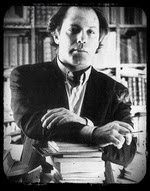Sometimes brilliant doesn’t work without bizarre and
bizarre doesn’t work without brilliant. The
Double is a good example of that. The very opening train scene, confusing
and eye-catching, Franz Kafka as done by David Lynch, will show you the way.
Whether the way is out or in, that’s a different matter entirely, but I was
purring with delight. Like a well-read and well-fed cat. A young man is sitting
in a completely empty carriage. Suddenly another passenger rises up in front of
him, asking the young man to give up the seat. The young man looks around,
bewildered. He then gives up the seat.
The young man’s name is Simon James (Jesse Eisenberg),
and he is but a muted fly in this Kafka-esque world of blue drinks, bureaucracy
and suicide. He loves a girl (Mia Wasikowska), but he is too shy to make a
pass. Nobody notices him, and that seems to suit him just fine until one day his
doppelganger arrives. James Simon is everything Simon James is not: witty, ballsy,
socially-confident. But the face is the same (‘you are not even Chinese, so
it’s pretty fucked up’). Physically the two men are completely identical. The
concept isn’t new, of course, but it will always be intriguing as long as you
do it right.
Richard Ayoade based his film on the eponymous novella
by Dostoyevsky and threw in Kafka, Lynch and a little Orwell (mainly the
colonel’s figure) for good measure. He did it right, The Double giving the impression of being both odd and extremely
well-honed. Controversially, I believe The
Double to be one of Dostoyevsky’s best works (in fact, only second to The Village of Stepanchikovo). It may
read like a clever Gogol pastiche, but it is also unique in that the brilliant
farce comes filtered through the existential issues Dostoyevsky would later
present in a rather different, religiously earnest tone.
The charm is that apart from being so stylish and well thought through, The Double is also wonderfully all over the place. The
bizarreness seems natural, and your laughter is genuine. The humour comes in
nervy, unlikely bursts and takes you off-guard. The scene with the doctor
(Paddy Considine – he also appeared in Submarine,
Ayoade’s debut film) was absurd genius, and that aforementioned quote was
effortlessly non-PC. Overall I’d say the acting is good, but this is more of an
idea-based film. Like pretty much its characters, the actors are statistically
insignificant. Simon and Hannah should never make as much sense as all that
silly printing they do. The words, too, become larger than life. ‘I am a
person. I exist’.
The Double
is a wonderful story of alienation and rebirth. It is short and concise. It
says all it wants to say in less than an hour and a half and leaves you with a strong
feeling that you’ve just seen something strange, inspired, challenging. Perfect for an awkward first date.














